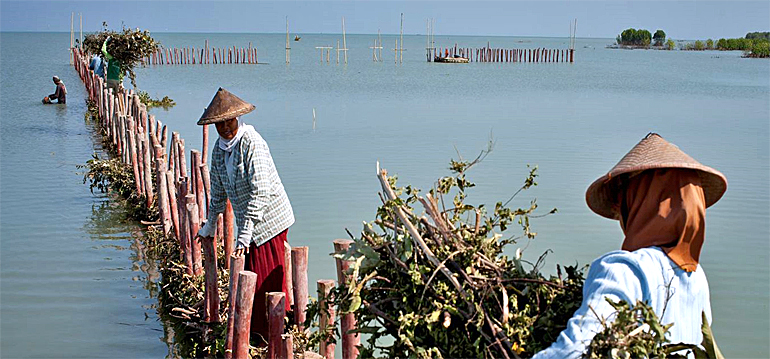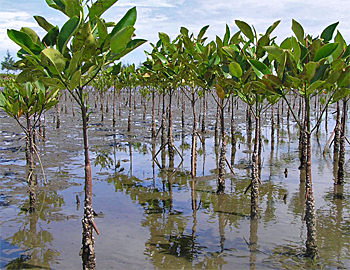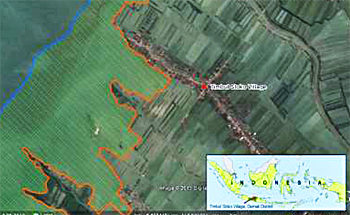Indonesia and Netherlands launch initiative for coastal safety Java
 The Indonesian and Dutch government launched a five-year public-private partnership initiative for enhancing coastal safety at the North Coast of Java.
The Indonesian and Dutch government launched a five-year public-private partnership initiative for enhancing coastal safety at the North Coast of Java.
The initiative aims to build stable coastlines with reduced erosion risk through integration of mangrove restoration, small scale hard-engineering and sustainable land use.
The project budget is 5 million euro, financed by the Dutch Sustainable Water Fund.
 Official launch
Official launch
The initiative was launched in Jakarta on 3 March by the Secretary General of the Ministry of Marine Affairs and Fisheries (MMAF), the Secretary of Central Java Province, and the Director of River and Coasts from Ministry of Public Works and Human Housing (PU) and the Dutch Ecoshape Consortium.
On behalf of Ecoshape, Wetlands International coordinates the initiative in partnership with the Indonesian Government, consultancy agency Witteveen+Bos, knowledge institutes Deltares, Wageningen University & Research Centre and Unesco-IHE, dredging companies Boskalis and Van Oord, local government and communities.
Dams of brush wood
It will focus on the most affected coastline in Demak district and is the follow-up of a successful pilot that finished in 2014.
The partners will construct a 9 kilometer strip of permeable dams made of brush wood and 300,000 m3 sediment nourishment to trap silt, regain lost land along this eroding coast and support rehabilitation of 90 hectares of mangrove buffer.
In parallel, the initiative will introduce sustainable aquaculture along the shoreline and support income diversification. This will lead to the transition from a mangrove-conversion model to a mangrove-based economic model.
 Up to 1 km coastal erosion at Demak between 2003 (blue line) and 2012 (orange line).
Up to 1 km coastal erosion at Demak between 2003 (blue line) and 2012 (orange line).
Strongly eroded coastline
In Northern Java 30 million people suffer from coastal flooding and erosion hazards, affecting 3,000 villages. The problems largely result from the removal of mangrove belts for aquaculture development, unsustainable coastal infrastructures, and groundwater extraction.
In some places more than 3 kilometers of land has already been taken by the sea and entire villages have been engulfed. Many people experience a major loss in income, reaching up to 60-80% in some villages.
About Building with Nature
The new Dutch-Indonesian initiative will be a leading international case of the Dutch programme Building with Nature for the development of new coastal engineering approaches, using natural protection by ecosystems like mangroves and salt marsh habitats.
In the Netherlands 'Building with nature' represents the transition of traditional infrastructure designs that typically fight against nature, towards more cost-effective solutions that work with and alongside nature.
The program is administered, represented and carried out by Ecoshape, a foundation by law.
The EcoShape consortium consists of private parties such as dredging contractors, equipment suppliers and engineering consultants, as well as public parties such as government agencies and municipalities, applied research institutes, universities and academic research institutes.
This news item was originally published on the website of Deltares, Ecoshape and Wetlands International.
Also read on this website
● Learning Alliance identifies pilot for green coastal protection in Kendari Bay, Indonesia, 27 February 2015
● Ecobas: Artificial oyster reefs can keep pace with sea level rise, 26 January 2015
● Deltas 2014: Early start climate adaptation in river deltas allows opting for cheaper natured-based solutions, 25 September 2014
● Deltares and Wetlands International invited to collaborate in nature-based coastal restoration in Indonesia, 24 March 2014
● Ecoshape lustrum: Understanding coastal ecology speeds up marine infrastructure projects, 22 November 2012
● Project: Demak district pilot
● Country: Indonesia
More information
Ecoshape
Dordrecht, the Netherlands
+31 78 6111 099
www.ecoshape.nl/en



